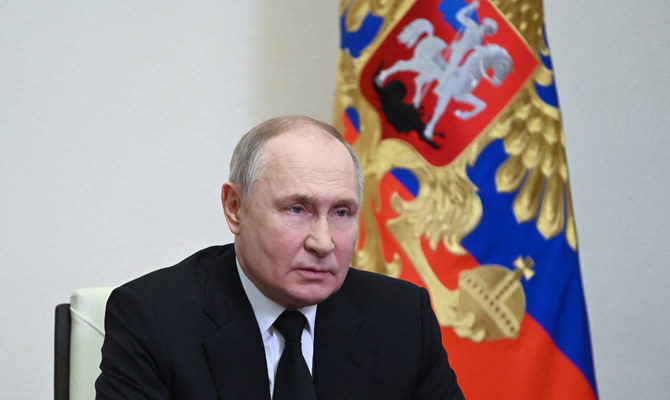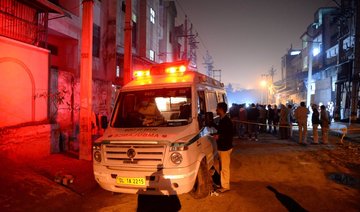MOSCOW: Russian President Vladimir Putin on Saturday vowed to punish those behind the “barbaric terrorist attack” on a Moscow concert hall that killed more than 130, saying four gunmen trying to flee to Ukraine had been arrested.
Kyiv has strongly denied any connection, with Ukrainian President Volodymyr Zelensky accusing Putin of trying to shift the blame onto them.
Putin, in his first public remarks on the attack, made no reference to a statement by the Daesh group claiming responsibility.
At least 133 people were killed when camouflaged gunmen stormed the Crocus City Hall, in Moscow’s northern suburb of Krasnogorsk, and then set fire to the building on Friday evening.
The Daesh group wrote on Telegram Saturday that the attack was “carried out by four Daesh fighters armed with machine guns, a pistol, knives and firebombs,” as part of “the raging war” with “countries fighting Islam.”
Daesh video
A video apparently shot by gunmen who carried out the deadly attack has been posted on social media accounts typically used by the group Daesh, according to the SITE Intelligence Group.
Al-Amaq, a Media Outlet linked to ISIS has released several Minutes of Footage which was Filmed by the 4 Tajik Terrorists during last night’s Terrorist Attack on the Crocus Concert Hall in the Russian Capital of Moscow; due to the Graphic Nature of the Footage I will not be able… pic.twitter.com/f7iSZRAoMj
— OSINTdefender (@sentdefender) March 23, 2024
The video, which lasts a minute and a half, shows several individuals with blurred faces and garbled voices, armed with assault rifles and knives.
They appear to be at the lobby of the Crocus City Hall concert venue in Krasnogorsk, northwest of the Russian capital.
The attackers fire several bursts of gunfire, numerous inert bodies are strewn about and a fire can be seen starting in the background.
The video appeared on a Telegram account considered, according to the SITE monitoring group, to belong to Amaq, the news arm of Daesh.
‘Deadliest attack’
It is the deadliest attack in Russia for almost two decades and the deadliest in Europe to have been claimed by Daesh.
Russian officials expect the death toll to rise further, with more than 100 wounded in hospital.
Russia’s Investigative Committee, which probes major crimes, said rescue workers were still pulling bodies from the burnt-out building on Saturday.
The emergency situations ministry has so far named 29 of the victims, the blaze having complicated the process of identification.
“Terrorists, murderers, non-humans ... have only one unenviable fate: retribution and oblivion,” Putin said in his televised address Saturday.
Calling the attack a “barbaric, terrorist act,” he said “all four direct perpetrators ... all those who shot and killed people, have been found and detained.”
‘Blame game’
Russian television showed security services interrogating four bloodied men, who spoke Russian with an accent, on a road in the western Bryansk region, which borders both Ukraine and Belarus.
“They tried to escape and were traveling toward Ukraine, where, according to preliminary data, a window was prepared for them on the Ukrainian side to cross the state border,” said Putin.
Putin also compared the attackers to “Nazis” and said the attack was an “atrocity, a strike against Russia and our people.”
Zelensky, in his evening address Saturday, dismissed the suggestion that Kyiv had been involved.
“What happened yesterday in Moscow is obvious,” he said. “Putin and the other scum are just trying to blame it on someone else.”
“They always have the same methods. It has happened before. There have been bombed houses, shootings, and explosions. And they always blame others,” he added.
Russia has arrested 11 people in connection with the attack, the FSB security service said. Earlier, the agency had said the attackers had “contacts” in Ukraine, without elaborating.
‘Mourning’
Putin named Sunday a day of national mourning.
And he promised: “All the perpetrators, organizers and those who ordered this crime will be justly and inevitably punished.”
The Investigative Committee said the death toll had so far reached 133 and the governor of the Moscow region said rescuers would continue to scour the site for “several days.”
Some 107 people were still in hospital, many in a critical condition, Deputy Prime Minister Tatyana Golikova said.
Daesh had first claimed responsibility for the attack on Friday night, repeating its claim again on Saturday.
Some witnesses filmed the gunmen from the upper floors as they walked through the stalls shooting people, sharing the footage on social media.
Then “the terrorists used a flammable liquid to set fire to the concert hall’s premises, where spectators were located, including wounded,” the Investigative Committee said.
Investigators said people died both from gunshot wounds and smoke inhalation after a fire engulfed the 6,000-seater venue.
Investigators said a man who jumped on one of the gunmen as he was shooting at the concert-goers, “immobilizing” him and thus “saving the lives of people around him” would receive an award.
Putin did not address Daesh’s claim of responsibility in his first public remarks Saturday, which came more than 18 hours after the start of the attack.
‘Common terrorist enemy’
But in Washington, a statement from the White House condemning the attack described the Daesh group as a “common terrorist enemy that must be defeated everywhere.”
The head of the state-run RT media outlet, Margarita Simonyan, posted two videos of interrogations of two handcuffed suspects. They both admitted to the attack but did not say who had organized it.
The interior ministry said all four of the suspected gunmen were foreign nationals.
Russian Telegram channels — including those with links to the security services — said they were from Tajikistan, a country that borders Afghanistan and where the jihadist group is active.
Tajikistan’s foreign ministry told Russia’s TASS news agency it was in close contact with Moscow over the matter.
In Moscow, residents stood in long lines in the rain to donate blood for those hospitalized, and mourners came to lay flowers outside the concert hall.
Memorial posters featuring a single candle replaced some advertising billboards in the capital and major events were canceled across the country.
Statements of condemnation from world leaders continued to roll in.
Just three days earlier, Putin had publicly dismissed a US warning of an “imminent” attack in Moscow as propaganda designed to scare Russian citizens.
The US embassy in Russia had warned on March 7 that “extremists have imminent plans to target large gatherings in Moscow, to include concerts,” advising caution over the following 48 hours.
Washington said after the attack it had also shared details directly with Moscow.
But speaking to FSB chiefs last Tuesday, Putin had called it a “provocative” statement and “outright blackmail... to intimidate and destabilize our society.”

























